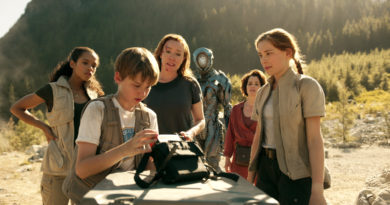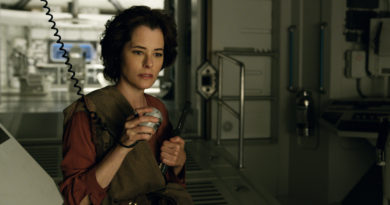Lost in Space Episode 7 Review: Pressurized
This Lost in Space review contains spoilers
Lost in Space Episode 7
One of the most charming aspects of Lost in Space so far has been its investment in problem solving as a plot device. The show, itself opens with the ultimate problem – Help! We’ve crash-landed on an alien planet! The whole conceit of this whole thing is for our characters to find a solution.
Even beyond that though, every episode has been presented as featuring a series of additional problems that the characters must confront. Help! Judy is trapped in the ice! Help! There is a weird dinosaur on the loose! Help! There is a big hailstorm coming!
For the most part this has made for watchable and interesting, if not riveting television. “Pressurized” is where all the problem solving becomes a bit much. The episode presents crises and their resolutions as a substitute to storytelling and not as augmentations of it. Not only that but the problems in “Pressurized” have begun to get repetitive.
Judy, Victor, Don, and company are still on their way back from the gas mission. Judy wants to get back to the Jupiter 2 quickly to let her mom know what they’ve discovered about Dr. Smith’s identity. Don prefers the “wait and confront Smith to her face method.” They settle on a horribly executed half-measure in which Judy radios home and unexpectedly gets Smith on the line. She doesn’t handle it very well.
Smith is likely cognizant of the fact that her ruse will soon be up but it’s going to take awhile for Judy to get back to warn everyone as the planet begins to exhibit some of those signs of “volatile seismic activity” that Maureen was talking about.
Judy and Don’s groups race against the exploding ground makes for good, kinetic television. It’s also another welcome reminder of just how wide open Netflix has opened its wallet for this show. Unfortunately, Lost in Space’s dedication to turning this crisis into another problem-solving exercise makes the whole affair seem overly familiar.
Even though someone actually dies this time (a rarity for the show thus far) the characters’ Chariot race doesn’t provide materially different problems to solve from what they’ve been doing all this time anyway. And the problems that are new come along with clichés. The moment one of the “redshirts” involved gets a name, it’s entirely too clear that his days are numbered. His name is Evan and he likes surfing, you see. Now feel please feel something, anything as he dies.
The circumstances in which Evan meets his fate are far too Philosophy 101. It’s the Trolley Problem if the trolleys were replaced by expensive all-terrain vehicles designed for intergalactic landscapes. Evan selflessly exits the Chariot as they are racing against time to re-secure the tanker to the Chariot. Unfortunately, he doesn’t make it all the way and a geyser blasts him off the Chariot and under the overturned fuel tank.
Judy requests that the fuel tank be moved immediately to save Evan’s life but Victor points out that if they do so, the rock holding the tank together will be removed and all the oil they just risked their lives for will spill out. He orders that they wait for a new container to arrive. Don, who has nothing if not a heart of gold, cannot abide by that and lifts the tank, himself, abandoning all the gas they recovered. Evan is saved but only momentarily. He later dies from his injuries on the ride back.
The issue with the “Evan or oil” conundrum is how carefully and literally constructed it all is. For the first time in the show’s brief history, a problem has arisen that seems like a writerly contrivance rather than the natural result of living on a dangerous landscape. Not only that but the moral consequences of the deciton-making process are spelled out so literally.
“So we lost the fuel for nothing,” Victor’s driver says.
We know, dude. We just saw. Let it breathe.
Other problems that arise in “Pressurized” are used as a shortcut for character development. Will is understandably upset that he just ordered his Robot friend to jump to his death. This creates a narrative opportunity for Penny and Will to connect as she’s actually decided not sneak out for once in her damn life and they remain the only two currently aboard the Jupiter 2.
It’s nice that Penny is trying to help her brother but her attempts to do so feel suspiciously like something a screenwriter could come up with. Penny does things like having Will “fly” around the engine room on a heavy piece of machinery or constructing a scale model of Robot together not because they’re helpful but because they translate well visually.
Thankfully, Mina Sundwall and Maxwell Jenkins have enough chemistry to almost make it work. On a plot level it’s just an example of the show becoming too singularly focused on problem solving. Is Penny the kind of person who would avoid a candid conversation with her depressed brother? Sundwall does a good enough job selling that she is but it’s hard to shake the sense that the show didn’t know how else to present Will’s sadness other than as a problem to be solved.
Funnily enough though, the most flagrant part of the episode’s overreliance on problem solving may also be its best plot. After Smith successfully uses his superpsychotherapist powers to suggest that Victor may have Angela the gun, John and Maureen head out in their Chariot to question her. On their way, however, they encounter the same tremors that felled Judy’s mission and crash into a tar pit. After John attempts to lasso them out of it, the Chariot actually sinks under the tar, trapping John and Maureen.
“You know what this reminds me of?” John asks Maureen. “That apartment in Glendale we had with no AC.”
It reminds you of that, John? Not the time you and Maureen got stuck under a satellite on the very same planet like three weeks ago?
This is a particularly egregious example of Lost in Space being far too locked into to a particular way of storytelling. The only way it knows how to engender any level of change between estranged married couple John and Maureen is to lock them into a confined space and have them think their way out.
Still, thanks to the outright professionalism and talent of Toby Stephens and Molly Parker: it works. The level to which John and Maureen are able to rebuild trust and a rapport while submerged under that tar pit makes me upset with the satellite situation from a few episodes back and not this one. That was the imposter, you see. This is where the real catharsis happens.
And it is both legitimately cathartic and hilarious when Maureen squeaks “I love you too” after their helium-assisted escape.
“Pressurized” also begins to set up what will presumably be some of the season’s final crises. Smith ventures out to Robot’s “death” spot and reassemble him pretty quickly as we all suspected. There is still a missing “spark” to him though and even though the pieces are assembled; he won’t fully come back to life. By examining Will’s video transmissions she seems to be onto to something.
Smith, who confesses to the unconscious Robot that her real name is “June Harris,” is motivated by something much simpler than we could have imagined. She just wants to get to Alpha Centauri to start a new life. She’s gone about that in a roundabout way but she’s on the verge of gaining access to the planet’s greatest weapon so who am I to judge?
When Victor returns home from his mission and tells his family that they lost the fuel, his son, Vijay, comes clean. He tells his father what Penny told him about the black hole and Victor assures his family that they’re going to get off this rock one way or another.
Those sound like intriguing, open-ended problems that require creative solutions. I trust Lost in Space to find compelling answers. This time around, however, could have used fewer problems and solutions.


